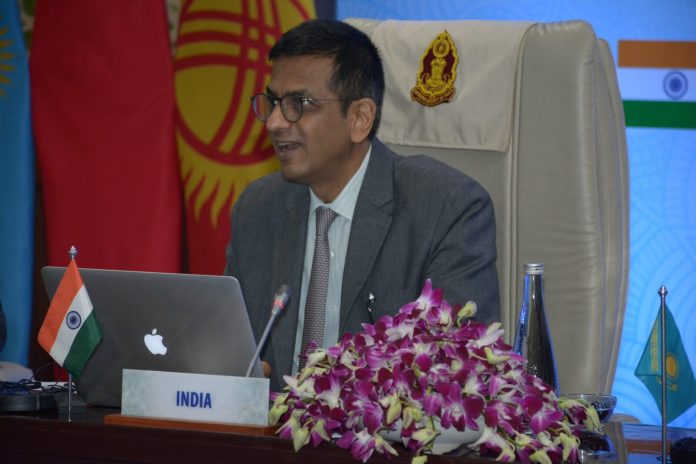Chief Justice of India D.Y. Chandrachud on Monday said that the Supreme Court has taken several initiatives to increase access to justice and make the courtroom a space available to persons belonging to diverse communities cutting across caste and economic status.
Speaking during the First Regional Conference on Access to Legal Aid, which started today at the Supreme Court premises in New Delhi, the CJI said they have strengthened the physical infrastructure to accommodate all.
He cited a report, which recommended battery-operated vehicles, hydraulic lifts and sign language interpretation.
The CJI said the Apex Court currently has nine gender-neutral restrooms, adding that steps have been taken to introduce an additional column for affixing the pronouns to lawyers.
He said the Supreme Court has recently appointed sign language interpreters, a step aimed at ensuring that individuals belonging to diverse communities, including gender minorities, were able to express themselves.
The CJI said it was important to take this discussion forward as it would help not only in generating significant dialogue, but also in arriving at principles and recommendations.
He said the discourse about human rights has been monopolised by the global north. It was imperative to amplify that this conference would serve to increase engagement between the countries of the global south.
As per the CJI, the concept of justice has been construed as applicable solely within the confines of a sovereign state.
CJI Chandrachud said given the intricate web of transnational relations, the concepts of justice have also changed. In transnational relations, all nations were not treated equally.
Global south has now become important for dialogue. He pointed out that this term was not geographical, but based on political, geopolitical and economic commonalities.
The CJI said terms such as developing and underdeveloped countries have gained currency beforehand since these countries have been at the receiving end of colonial rule and imperialism, which resulted in unequal power.
Today this conception has changed, there has been a universal shift in wealth from the Atlantic to the Asia Pacific. Three of the four largest economies will be from the global south in future, he added.
Regarding access to justice, the CJI said public interest instruments allowed all citizens to approach the Supreme Court back in the 1980s. This resulted in the Apex Court being widely regarded as a people’s court.
The top court of the country takes all appeals in a week’s time, ranging from the petition of a prisoner on death row seeking psychological assessment, a petition filed even after the judgement attained finality that they were juvenile, to the plea of a woman who was denied access to child in a violent marriage.
The National Legal Services Authority of India (NALSA), in association with the Government of India, is hosting the First Regional Conference on Access to Legal Aid, which started at the Supreme Court premises in New Delhi today.
The two-day conference is being organised in collaboration with the International Legal Foundation (ILF), the United Nations Development Programme (UNDP) and the United Nations Children’s Fund (UNICEF).
The event is expected to provide a platform for sharing best practices and identifying innovative solutions to improve access to justice in the participating countries.
The key areas for deliberations include developing effective examples of people-centric justice systems, measuring quality of legal aid services, strategies for reducing pre-trial detention, early access to legal aid in criminal cases, legal aid in civil cases, sustainable funding mechanisms, child friendly legal aid, etc.
This Regional Conference follows a call made by the participants of the second International Conference on Legal Aid in Criminal Justice Systems held in Argentina in 2016 for conferences to be organised at the regional level.
This Conference will showcase India’s ‘Access to Justice’ framework, which is one of the most developed in the world in terms of guaranteeing vast coverage of the population, promising universal access to legal aid for all forms of judicial and quasi-judicial legal processes and for advancing ‘Ease of Justice’.
It is a first-of-its-kind platform where the leaders of the two pillars of democracy – legislature and judiciary – will come together to accelerate the progress towards Sustainable Development Goals.
Vice President Jagdeep Dhankar, Union Law Minister Arjun Ram Meghwal, Supreme Court judge Justice Sanjay Kishan Kaul, among others, were present on the occasion.


